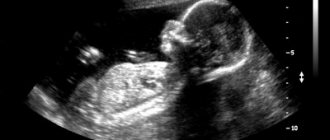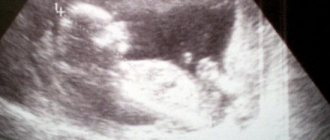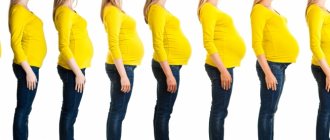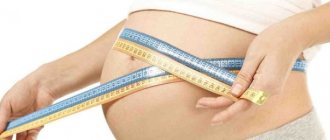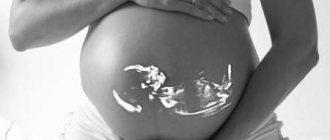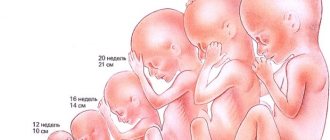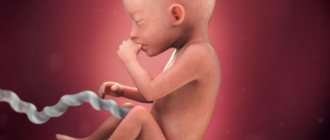By the end of the twentieth week of pregnancy, its first half will also end - after all, five obstetric months have already passed. This is an important milestone for a pregnant woman - she begins to fully understand all the responsibility for the baby, because now she feels him better.
The baby is also going through an important stage - the formation of his organs is finishing, and from now on he will grow and improve. He begins to take control of his body - it is not without reason that it is at this time that mothers first feel the baby moving.
Many mothers feel anxiety and fear for the life and well-being of the baby. If you also cannot get rid of these emotions, seek the help of your loved ones, meet mothers on the playground who are in later stages or have even already given birth to a baby - their help and advice will help you a lot!
20th week of pregnancy: how many months have passed? The fifth obstetric month of pregnancy ends (in one obstetric month there are exactly 4 weeks, or 28 days).
Belly at 20 weeks of pregnancy
At this stage, the belly can no longer be hidden. It becomes “blurry”, and then the waist disappears completely. During this period, it is useful to use gels or creams that will help avoid the appearance of stretch marks on the abdomen.
It is quite possible to replace special products with vegetable oil. However, to obtain the desired effect, such products should be used daily: rub them with massage movements into the stomach, hips and chest.
Uterus
At this stage, the abdomen grows as the uterus enlarges, which is already almost at the level of the navel and is sometimes capable of contracting. Such contractions are called false contractions. However, there is no need to worry: there is no threat to the fetus.
There may be false contractions at this time
What to watch out for
The most dangerous thing during this period is that a woman can feel absolutely healthy, but the baby, nevertheless, will be in danger. Therefore, it is imperative to follow all the recommendations of the gynecologist. If a miscarriage occurs during this period, then there is a very low percentage that the baby will be able to survive in artificially created conditions.
Constant medical supervision is an essential condition for pregnancy. If symptoms such as: pain in the lower abdomen associated with increased uterine tone appear; copious vaginal discharge with a specific odor; increased
Only timely, qualified assistance will help save the life of a little man.
Ultrasound
The need for an ultrasound at this time may be necessary due to:
- assessing how the pregnancy is going;
- establishing the sex of the baby;
- identifying possible defects and anomalies in the fetus;
- determining whether the size of the baby corresponds to the gestation period, etc.
An ultrasound at week 20 is also necessary to examine the baby’s internal organs. His heart also requires a serious examination: if pathology is detected, a specialized ultrasound of the heart will be needed.
Individual experiences and typical symptoms
The 20th week of pregnancy is the period when the uterus enlarges quite noticeably. The navel may protrude. It takes the form of a small button or button. At this stage, it is definitely necessary to take care of changing your wardrobe. This is especially true for women who will give birth in the winter and spring. Carrying a baby will have to be done during the cold season. Warm pants and outerwear are essential to ensure the comfort of mother and baby.
Signs of pregnancy at 20 weeks:
- Increase in hip volume.
- Due to an increase in circulating blood volume, fluctuations in blood pressure may occur. They manifest themselves as dizziness and general weakness.
- At this stage, all expectant mothers should already feel the movements of their own baby. Women's descriptions of this process compare it to the fluttering of a butterfly inside or the movement of a small worm. Over time, the tremors intensify. The baby's nighttime somersaults are especially noticeable.
- For most expectant mothers at this stage, the quality of hair, nails and skin improves significantly. Libido may increase.
Many representatives of the fair sex note a general improvement in mood and a surge of energy. Performance increases. However, you should not abuse the load. The expectant mother needs more rest.
Carrying twins: features
The heart of a woman carrying twins in her womb has to work twice as hard, because the blood needs to be pumped twice as much. Accordingly, fatigue increases, the load on the kidneys increases, etc.
If a woman is carrying two (or more) children, you should pay attention to the signs of polyhydramnios.
The peculiarity of such a pregnancy is that blood flows to one placenta in a reduced volume, and to the other, on the contrary, in a larger volume. It is difficult to change this state of affairs, but in specialized clinics it is quite possible. However, in this case there is no threat - neither for the pregnant woman herself nor for the babies. And the children will most likely be smaller than usual.
Fetus at 20 weeks
The “parameters” of the baby at week 20 are as follows: length is 25 cm, weight is about 0.35 kg.
The baby is fully formed, continues to grow, and the functioning of its organs is improving. The digestive, hematopoietic and nervous systems are already fully functioning. The respiratory organs also work. The heart beats audibly: its rhythm can be fully audible with a stethoscope.
The baby's upper and lower limbs have also already taken shape, there are nails, and the first hairs on the head.
The baby in the womb can do more and more
At week 20, the baby fully senses sounds and already reacts to light: his eyelids begin to open slightly.
The baby's skin thickens, and the so-called vernix lubrication is produced, which will subsequently make it easier for him to slide through the birth canal and, in fact, to be born.
Fetal development
The baby continues to actively grow and develop. Every day it takes up more and more space in the mother’s abdominal cavity and has a corresponding effect on her. The 20th week of pregnancy is characterized by the following changes in the baby’s body:
- The skin of the fetus is finally formed. It already has 4 full layers. The sweat and sebaceous glands function at full capacity.
- Original lubricant appears on the surface of the skin. It is fixed there with the help of a gun - lanugo. Together they protect the baby's body.
- The amount of hair on the top of the head continues to increase.
- The baby clearly distinguishes between day and night. This affects its activity at different times of the day.
- Little by little the eyes open.
- The child hears well and reacts to sound. May be frightened by music that is too intense or loud screams.
- The cerebral cortex is actively growing. Furrows appear.
- The child can evaluate the emotional tone of the mother's voice. Therefore, at this stage and throughout pregnancy, you should worry less and conflict with relatives and neighbors, and communicate more with your baby.
- Facial features are becoming more visible. Eyebrows begin to grow.
- The child's dimensions reach 25 cm in length and weigh 250-320 g.
Feel
From time to time, the expectant mother feels slight movements and tremors inside herself. At first barely noticeable, the movements become more and more noticeable. But it is worth paying attention to the intensity and nature of these movements. If the tremors are very frequent, it is obvious that the baby does not have enough oxygen.
The sensations at this time are not so “pleasant” due to the constantly increasing size of the uterus. It puts more and more pressure on the internal organs. It is because of these changes that arise:
- deterioration of urine outflow;
- heartburn;
- dyspnea;
- constipation
But a woman will forget about such troubles immediately after giving birth.
Drinking milk in small sips will help relieve heartburn.
What's happening to mom?
By the 20th week of pregnancy, many women have already had a second ultrasound and know the gender of the baby. The rest will do this within this or next week. Now that it is no secret to future parents that they are expecting a boy/girl, and the main risks are behind them, the most magical time of the entire pregnancy is coming. It's time to think about buying baby clothes. Choosing a crib, stroller, changing table, first rattles, diapers, bottles, pacifiers, tiny T-shirts, panties, socks - all this is very exciting and can lead the expectant mother to real delight!
At the 20th week of pregnancy, the uterus rises and continues to increase in volume. The abdomen continues to grow and is already noticeably protruding forward, with the navel protruding slightly. Women stop hiding their situation; now they are happy and glowing from within. It's time to buy clothes that do not hide, but, on the contrary, emphasize the “interesting situation”.
By the 20th week, almost everyone feels fetal movements, regardless of whether this is the first or second pregnancy. It is important to monitor the number of kicks and movements of the baby.
If the baby is constantly spinning and pushing, this may mean that he does not have enough oxygen, and the mother needs to walk more in the fresh air. You can also sign up for gymnastics for pregnant women.
At week 20, the breasts fill up and become heavy, and the sensitivity of the nipples increases. Some women notice the appearance of colostrum from the breasts. This phenomenon is completely normal and natural. Colostrum seems to foreshadow future breastfeeding. Under no circumstances should you squeeze it out; just wipe it off with a napkin.
Belly at 20 weeks of pregnancy
Pain
Often, women at this stage of pregnancy are very concerned about pain that occurs in the lumbar region and back. This happens due to a shift in the center of gravity, as the load “falls” on the back muscles, ligaments and joints.
Gymnastics that “unload” the spine will help prevent pain. It is also necessary to maintain correct posture, stop wearing high-heeled shoes and try not to strain your back.
Pregnant women at this stage are often also bothered by leg cramps (this is inevitable in many cases, since a woman’s weight is constantly increasing, as is the load on her legs). Moreover, the pain can be quite intense.
To reduce the likely occurrence of this pathology, let's systematically rest our legs, do not forget about a relaxing massage (it is very useful in this case for the calves and feet). Also try to lie down on your bed as often as possible, raising your legs up for a few minutes.
The nature of abdominal pain may indicate the presence of dangerous pathologies
If abdominal pain appears at this time, in some cases this is a cause for concern: perhaps this is a manifestation of increased uterine tone and there is a threat of miscarriage. In any case, whether such pain appears periodically, is not very intense, or even more so, if it is very noticeable, be sure to consult a doctor.
Condition of the female body
The uterus rises. The abdomen increases in size, the navel may protrude slightly.
Often, women begin to have difficulty breathing from the twentieth week of pregnancy. This occurs due to the growth of the fetus, which puts pressure on the lungs. Breathing will return to normal after the baby descends into the pelvic cavity. This will happen only shortly before giving birth.
Stretch marks may appear. Their number directly depends on hereditary factors, skin type, characteristics of epithelium care and nutrition of the woman.
Discharge at 20 weeks of pregnancy
It is pain in the abdomen (sharp or not so sharp, but differing in duration) with bloody discharge that can be a harbinger of a miscarriage. The above signs may also indicate placental previa or placental abruption.
Consultation with a gynecologist is also necessary in this situation.
If there is spotting, which appears mainly after sex or a gynecological examination, and no pain is felt, this is probably a manifestation of cervical erosion.
Normal discharge at this stage of pregnancy:
- light shade;
- with a slightly sour smell;
- have a uniform consistency.
If the discharge changes color, becomes cheesy, or certain impurities appear, this indicates infection.
To stop the pathological process that has begun and not to “start” the disease, be sure to consult a doctor.
Fever and colds
At the end of the 5th month of pregnancy, the risk of viral infection for the fetus is reduced. However, if mommy has a cold, this may cause:
- fetoplacental insufficiency (in this case, the child may experience oxygen deficiency);
- delayed development of the baby;
- premature pregnancy.
It is unacceptable to neglect serious treatment of even a trivial cold. In this case, gentle therapy is indicated for the pregnant woman (since it is better for pregnant women to avoid medications that are usually used).
If you have a cold, you need treatment prescribed by a specialist.
It will be prescribed by the gynecologist observing the pregnant woman. Measures that must be observed for the expectant mother are:
- bed rest;
- gargling;
- drinking plenty of water;
- rinsing the nasal sinuses with solutions - soda or saline;
- Decoctions of medicinal plants are also effective in this case.
Diet
The diet at the beginning of the 6th month of pregnancy, of course, should remain the same balanced and healthy. Do not forget about the need to eat as natural products as possible.
You should not eat food from public catering establishments
Ideally, eat meals frequently throughout the day, but in small portions. Have full breakfasts and lunches, and dinner should be light food. Be sure to include the following in your diet:
- lean meat;
- lots of fruits and vegetables;
- porridge;
- dairy and fermented milk products.
In addition, listen to your own body when it’s craving “something like that.” Still, it is better to replace, for example, chocolate or sweets rich in carbohydrates with other, healthier products. Because these carbohydrates are empty and not at all healthy.
It is better to “get” them from bran bread, cereals and other foods. In addition, they are also rich in vitamins and other useful substances: fish, vegetables, fruits.
Also remember to moderate the amount of salt you use when cooking. It promotes water retention in the body, and as a result, the occurrence of completely unnecessary edema.
A pregnant woman's diet should be balanced
Weight
During this period, you should strictly monitor your weight. Excessive deviation from the norm with natural weight gain (3 kg is considered the ideal gain at the 20th week) can significantly complicate childbirth. During this period, do everything possible to ensure that your gain each week does not exceed about 0.5 kg.
Sex
Intimate life is not prohibited during this period. Of course, if there are no contraindications for this. You just need to take into account that when having sex during this period, you should practice those positions that do not involve pressure on your stomach.
Also, the intensity will not be entirely appropriate. In addition, it is important to keep your own feelings under control during sexual intercourse: if any discomfort occurs, you should definitely stop and seek advice from a doctor.
Features of child development
During this period, the baby already has hair and small nails on his fingers. His skin becomes thicker than before. The sebaceous glands begin to produce a special secretion – vernix lubrication. Thanks to its wax-like structure, it perfectly protects the delicate skin of a little person from the effects of amniotic fluid. The secretion will be actively produced right up to childbirth, and the original fluff will help it retain it.
The baby is actively developing. By this time he had already learned to yawn, tumble, play with the umbilical cord, hide his face in his hands, squeeze and unclench his tiny fingers.
The size of the baby at the twentieth week reaches 16 cm, and the weight approaches 260 grams.
The doctor may suggest listening to the baby's heartbeat using a sound tube or electronic device.
Tests at 20 weeks of pregnancy
If until now a pregnant woman was required to visit a doctor and take tests once a month, then, starting from this period, doctor’s control is required at least 2 times a month. Tests at the 20th week, like an ultrasound, may be needed:
- for urine examination (to determine whether kidney activity is normal);
- for blood tests (sugar levels are monitored and the presence of anemia is determined);
- to measure uterine enlargement.
According to indications, ultrasound is often supplemented by a biochemical blood test. The latter, in particular, allows you to assess the level of the hormones hCG, estriol and alpha-fetoprotein in the blood of the expectant mother. Deviations from standard indicators reveal the risk of a child being born with certain developmental defects.
Calmness is very important for a pregnant woman
Frozen pregnancy
Although a non-developing pregnancy is a phenomenon more typical for the early stages, it still happens at the 20th week. The reason for this may be:
- endocrine disorders;
- the influence of various negative factors;
- failure of progesterone production.
However, if a non-developing pregnancy at its very beginning can be identified only with the participation of a specialist, then a woman can “recognize” the same pathology at 20 weeks herself. Reasons for concern - the belly stops enlarging, and the fetus itself, accordingly, stops moving.
And yet it should be understood that the child does not have to move constantly: he also has his own sleep and wakefulness schedule. Therefore, if the baby does not move for some time, perhaps he is simply sleeping.
As a rule, a frozen pregnancy is easily detected at this stage: through ultrasound, as well as by checking the fetal heartbeat.
A healthy pregnancy is possible only for a happy woman
What's happening to the baby?
What does a baby look like at 20 weeks of pregnancy? This is already a real little man. The growth of the fetus has already reached 23-24 cm, and its weight is about 300 grams.
Fetal development continues. Now all organs and systems are being improved. They are preparing to function independently outside the mother’s body. The skin becomes denser and fat begins to form and accumulate underneath it.
At week 20, the baby opens his eyes for the first time. He already has not only eyelids, but also eyelashes. The baby can see light, distinguish sounds and voices, turn its head and suck a finger. He has already developed his own sleeping and waking patterns, which his mother notices. Most of the time the baby is calm, but is replaced by periods of activity when he tumbles and twitches his arms and legs.
By this time, some babies already prefer to lie head down. If this is not the case, it is too early to worry. While the baby still has enough space for somersaults and turns, he will turn over more than once.
Doctors' recommendations at 20 weeks of pregnancy
To make your pregnancy easier, try to follow the following expert advice:
- Don't avoid exercise. And in this case we are not talking about intense exercise; it is enough to perform light exercises that help stabilize blood circulation, reduce pain in the lower back, and improve general condition. Among other things, training will help prepare the body for the upcoming birth process.
- Attend courses for expectant mothers. Special trainings will mentally prepare you for childbirth and your upcoming new life as a mother. During the classes you will also be able to gain the necessary information regarding the proper care of your baby from the first days of his life.
- It is worth considering that it is not recommended to wash yourself using a shower head, while douching is completely prohibited during this period. If for some reason you have no other way to wash yourself than in the shower, try to ensure that the water jets do not penetrate deeper than 2–3 cm into the vagina. This is important because intense flows of water can cause bleeding or air embolism. (when air enters the blood).
- And, of course, try to radiate smiles and be in a good mood: after all, this is also passed on to your baby.
